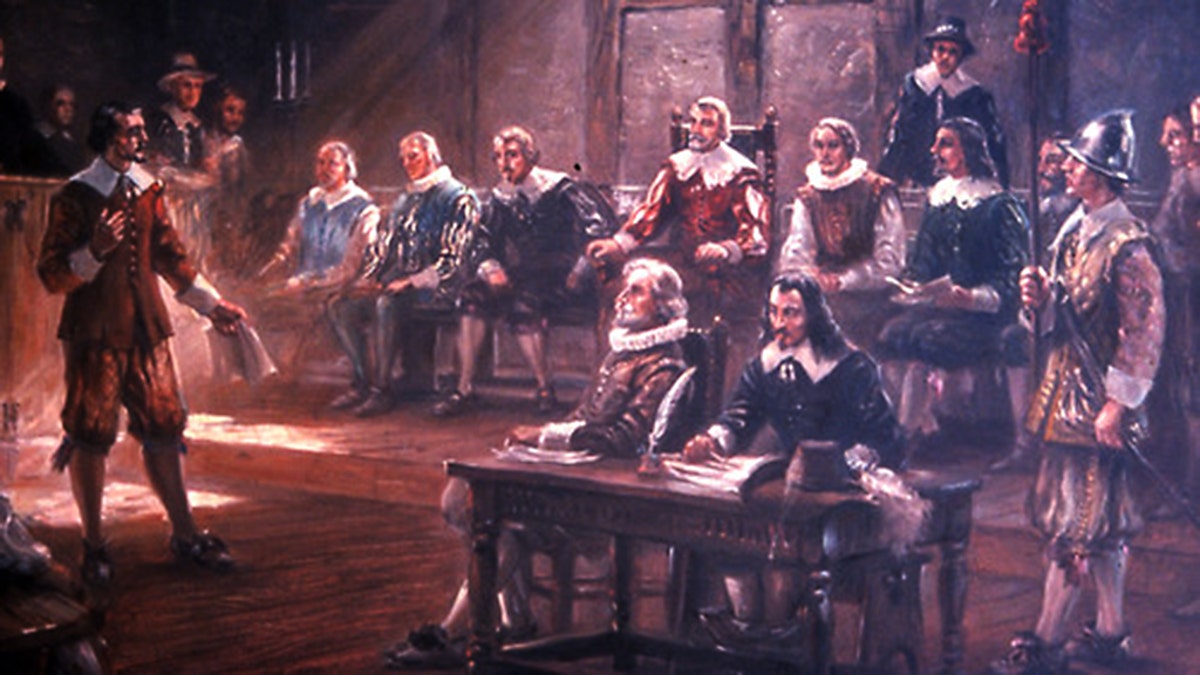
A modern painting by Sidney King (circa 1950s) portraits the first legislative assembly held in English North America.
If you were at Jamestown—the tiny English settlement on the banks of the James River in Virginia—399 years ago this week, you probably would have been aware that something unusual was happening.
Over in the rough-hewn, thatch-roofed church building, 22 duly elected settlers, six councilors, and their newly arrived governor, all white males, were braving the intense summer heat to attend the first meeting of the “general Assemblie.” A new English charter a year earlier had authorized formation of this first representative assembly in the dozen-year-old colony, and the new governor, Sir George Yeardley, had seen to the charter’s implementation.
It was the beginning of representative democracy in America, the forerunner of our Congress, state legislatures, and other representative bodies.
Planted in Virginia a year before the Mayflower arrived from England, representative government would take root firmly, blossom in 13 largely self-governing colonies, and after independence grow into the great tree of American liberty, inspiring similar plantings in much of the world.
It hardly seemed like a monumental event at the time.
The burgesses met for less than a week, dealt with practical concerns like setting a tobacco price floor, relations with the Indians, and some criminal cases, and then departed one man down. Mr. Shelley of Smyths Hundred grew ill and passed way from the heat. Governor Yeardley and others also fell sick but survived.
Representative government is frustrating today, but at least the survival rate has improved.
Next year will mark the 400th anniversary of this hugely important, if rudimentary and tragedy-laced, beginning. It will present an opportunity to reflect on how far representative democracy has come and how far it still has to go.
In addition to ceremonial events, the 2019 “American Evolution” Commemoration will feature highly substantive dialogues on the challenges confronting representative democracies today.
Honest history usually is hard history, but it is how we learn, adapt, overcome, and improve.
The first will take place in May 2019. The University of Virginia and surrounding presidential homes will be the site of the Global Pathfinder Summit, a program that will embed 200 students and young adults—half from the United States and half from other countries—in a week-long series of reflections and discussions on civic engagement. How to motivate and mobilize a new generation to take part in the “hard work of democracy” will be the focus.
A major digital component will link the dialogue to democratic activists around the world and yield an expanded international network of connected and mutually supportive young leaders committed to effective self-government.
A related University of Virginia program, the Presidential Ideas Festival, will engage these young “pathfinders” in examination of the elected executive’s role in democratic systems.
Then, in late July 2019, the College of William and Mary will host the International Forum on the Future of Representative Democracy in Williamsburg, Virginia.
Congressional leaders, prominent officials from state and municipal legislative bodies in the United States, and a diverse array of international legislative leaders are among those expected to attend.
Coinciding with ceremonies at nearby Jamestown marking that first assembly’s 400th anniversary, the Forum will bring together these accomplished democratic leaders and practitioners with advocates, scholars, and commentators for a wide-ranging exploration of major challenges facing representative systems in the 21st century.
Virginia, ground zero for the start of representative government and America’s founding, will again be the locus of vital discussions about the capacity of free women and men to engage productively as members of a diverse yet unified self-governing community.
The May and July democracy-focused gatherings are part of a year-long “American Evolution” program that will highlight the 400th anniversary of multiple events that have shaped modern America.
That first legislative assembly was only one of the landmark events that date to the extraordinary year, 1619, in Virginia. Others include the arrival of the first recorded Africans in North America, the first recruitment of female settlers in significant numbers, the first official English Thanksgiving, and the start of entrepreneurial ventures in the colony.
Honest history usually is hard history, but it is how we learn, adapt, overcome, and improve.
While some of the beginnings traceable to 1619 were laudable from the start, others are lamentable for the rank injustice, hardship, and suffering they occasioned. Together, they set in motion four centuries of struggle, striving, and contributions that have shaped what America is today and is still becoming—a country defined by its distinctive democracy, diversity, and opportunity.








































